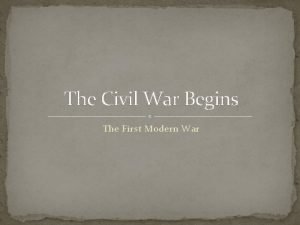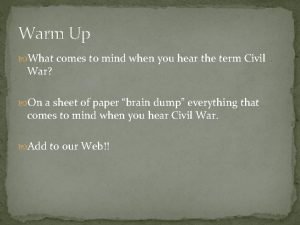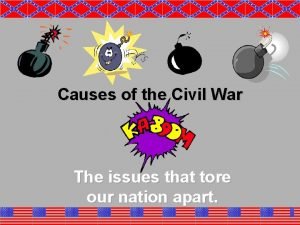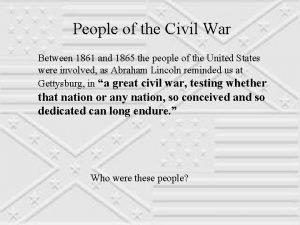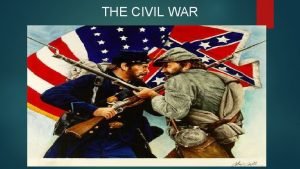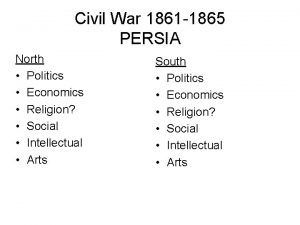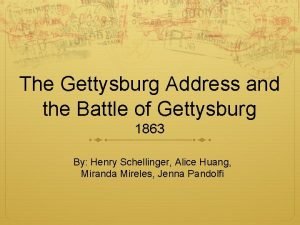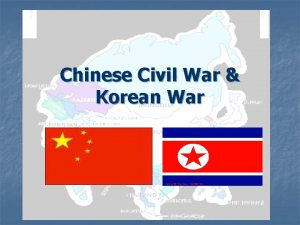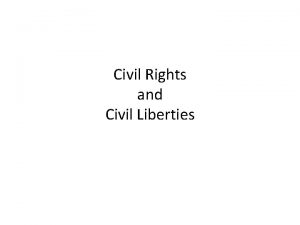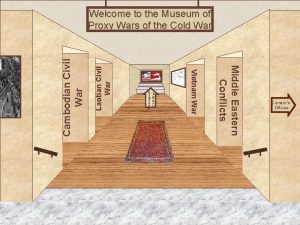The Road to the Civil War The Road











- Slides: 11

The Road to the Civil War

The Road to War: 1850 -1860 Causes of War: Slavery, but also… • Westward Expansion (of slavery) • State’s Rights (essentially, the right for a state to decide the issue of slavery) • Abolitionists (increased violence between abolitionists and pro-slavery advocates) • Free labor (fear that slavery was limiting the employment opportunities of white men in the West) • Sectionalism (regional differences between N, E and W) • Different views of democracy

Political Divisions • Wilmot Proviso (1848) • No slavery in territory acquired from Mexico (rejected) • Election of 1848 (Dem v. Whigs) - Zachary Taylor (Whig) - Martin Van Buren (Free Soil) - Lewis Cass (Democrat) - Gerrit Smith (Liberty) Whigs split over slavery, but Taylor still won with 163 electoral votes to Cass’ 127

Slavery in the West • Debate over what to do with Western Territories (possibly extend Missouri Compromise line) • Issue of what “free territory” meant, whether slaves were property, over whether popular sovereignty was a legitimate solution to the issue of expansion of slavery in the West The application of California for statehood started the debate over slavery again…

Compromise of 1850

Uncle Tom’s Cabin (1852) Uncle Tom’s Cabin was written by Harriet Beecher Stowe in 1852 (daughter of Lyman Beecher, the famous preacher of the Second Great Awakening) The novel depicts the reality of slavery while also asserting that Christian love can overcome something as destructive as enslavement of people Popular in both US and Britain and increased support for the abolitionist cause, but also reinforced stereotypes of African Americans that still persist to this day

Growing Divisions National Political Parties Whigs and Democrats splintering into northern and southern factions due to slavery. Sectionalism and slavery stronger than party allegiances President Franklin Pierce (1852 -6) Hoped nationalism and expansion (Manifest Destiny) would unite North and South “Young America” movement - advocated free trade, social reform, expansion southward into the territories, and support for liberal republican movements abroad (Cuba) Slavery in the West was tearing the nation apart

Kansas-Nebraska Act (1854) - Popular sovereignty - “Bleeding Kansas” - Brought about birth of Republican party (made up of former Whigs, Free Soilers, immigrants, frustrated Democrats)

Conflict Intensifies • Election of 1856 - James Buchanan (Dem) - John Fremont (Rep) - Millard Fillmore (Know-Nothing) Buchanan won with 45% of the popular vote. The major issue was the expansion of slavery into the western territories. He emphasized popular sovereignty as a solution to the issue and argued that both the Know-Nothings (by avoiding slavery and focusing on immigration issues) and the Republicans (by wanting to ban slavery entirely) were extremists whose victory would result in Civil War. • Dred Scott v. Sandford (1857) • Lincoln-Douglas Debates (1858) • Raid on Harper’s Ferry (John Brown)

Election of 1860 This election had the most significant consequences of any election in US history. • Democrats: split between West (supported popular sovereignty) and South (wanted a full endorsement of slavery) • Republicans: tried to appeal to a larger voting block by embracing high tariffs, internal improvements, popular sovereignty Lincoln won with a majority of electoral votes (180) and this was the final signal to white southerners that there was limited support for them in the Union government. South Carolina started the process of secession only weeks after the election ended and by Dec. 20, 1860 voted unanimously to leave the US.

 Why was the civil war considered the first modern war
Why was the civil war considered the first modern war Chapter 16 lesson 2 challenges to slavery
Chapter 16 lesson 2 challenges to slavery Civil rights webquest
Civil rights webquest English civil war mind map
English civil war mind map What are the 3 main causes of the civil war
What are the 3 main causes of the civil war Unit 5 civil war and reconstruction
Unit 5 civil war and reconstruction Civil war 1861/1862
Civil war 1861/1862 Civil war guided notes
Civil war guided notes The civil war ended
The civil war ended Civil war basics
Civil war basics Civil war advantages and disadvantages chart
Civil war advantages and disadvantages chart Gtech gettysburg
Gtech gettysburg
